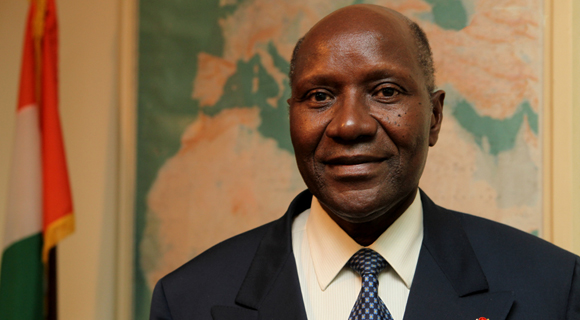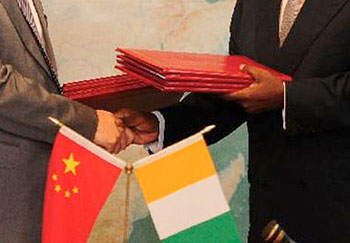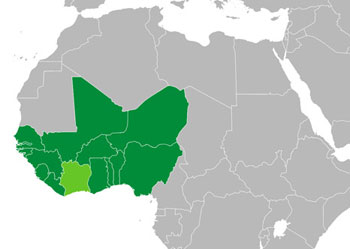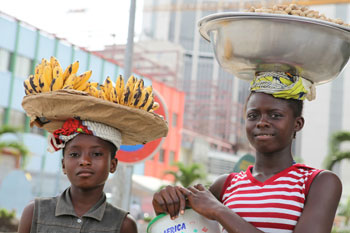Daniel Kablan Duncan: Prime Minister of Côte d’Ivoire
Côte d’Ivoire’s foreign policy revolves around the values of dialogue, peace, and cooperation with the rest of the world. President Félix Houphouët-Boigny emphasized that dialogue is the weapon of the strong, not the weapon of the weak. Problems need to be solved through dialogue. Côte d’Ivoire should be the place where problems are solved.
Interview with H.E. Daniel Kablan Duncan, Prime Minister of Côte d’Ivoire

What is the current position of the Ivory Coast in terms of international relations, and what role should Côte d’Ivoire play on the international scene?
Ivorian diplomacy has played an important role in the development of Côte d’Ivoire by opening the country to the world. This country gained independence on August 7, 1960, and it has been important for Côte d’Ivoire to create good relationships with other countries since that day. The first Minister of Foreign Affairs was the President himself, Félix Houphouët-Boigny.
Côte d’Ivoire’s foreign policy revolves around the values of dialogue, peace, and cooperation with the rest of the world. President Félix Houphouët-Boigny emphasized that dialogue is the weapon of the strong, not the weapon of the weak. Problems need to be solved through dialogue.
He also stressed the importance of peace both within the country and with its neighbors.
Finally, being open to the rest of the world was paramount in 1960. Houphouët-Boigny wanted Côte d’Ivoire to reach the same level of development as other countries. He also chose economic liberalism, which was rather rare at the time, whereas most decolonized African countries chose Marxism. It was a daring choice but it helped Côte d’Ivoire develop at faster rate than other African countries.
Thirty years later, it is obvious that he made the right choices. Between 1960 and 1980, the annual economic growth rate of Côte d’Ivoire was 7%. Côte d’Ivoire enjoyed the status of an advanced country in the third world, along with Korea and Thailand. President Houphouët-Boigny always said that Côte d’Ivoire should be everyone’s friend and no one’s enemy.

He wanted Côte d’Ivoire’s foreign policy to take certain factors into account, namely West Africa, the sub-region where Côte d’Ivoire is located; Côte d’Ivoire was to integrate its neighboring countries into its policy. This is why Côte d’Ivoire took part in various regional agreements and organizations, such as the Conseil de l’Entente, the West African Economic and Monetary Union, the Economic Community of West African States, and the Mano River Union, to name but a few. He has also maintained traditional links with France, the colonizing country, because he thought that such a relationship would only serve to benefit the country.
On an international level, Côte d’Ivoire should be the place where problems are solved. When there is a conflict in Africa, negotiations should take place in Côte d’Ivoire. Again, it was president Houphouët-Boigny who would try to find solutions to conflicts. In Liberia, in Sierra Leone, in South Africa, and in Angola, Côte d’Ivoire has played an important role in conflict resolution.
Côte d’Ivoire should also be a leader and the main engine of economy in the West African region. It should be a welcoming land. The vice minister of foreign affairs of Luxembourg stated that foreigners make up 40% of Luxembourg’s population. In Côte d’Ivoire, they make up 26% of the entire population, but when comparing both these countries’ sizes, Luxembourg has 500,000 foreigners whereas Côte d’Ivoire has more than 5 million. It can bring about certain problems, but Côte d’Ivoire has decided that it should be a new age Babylon and take advantage of its diversity.
Côte d’Ivoire hopes to set a beautiful example of democracy in Africa now that the turmoil has ended.
What key geographical areas should Ivorian foreign policy center on?
It is now essential to ensure peace, safety, and national reconciliation. The next step is to reflate the country’s economy. Ivorian diplomacy plays a role in these 3 sectors. A number of Ivorian citizens have fled to neighboring countries – we need to make them return. There are 150,000 of them in Liberia, 15,000 in Ghana, and 4,000 to 5,000 in Togo. They must return and take part in the elections on December 11 this year.
Côte d’Ivoire wants to be friends with everyone. It’s best to diversify diplomatic ties and partnerships. The country recently held a conference with the theme “Ivorian diplomacy: Mission, Assessment, Prospects 2025”. The purpose was to learn lessons from the past and consider the future of Ivorian diplomacy in the coming 15 years.
Ivorian diplomats need to see the world as it is and adapt to it, and more importantly, they need to foresee change. At the moment, one of the main characteristics of the outside world is the increased penetration of ICT. When Japan was hit by a tsunami, the rest of the world knew immediately. There are also new themes and topics that have emerged in the diplomatic landscape, such as environmental matters.
Côte d’Ivoire first heard of this in Rio 1992, where token gestures were made. Today, this issue is central. New institutions and entities have appeared, such as NGOs and foundations. They sometimes have more resources than states themselves.
A huge shift in balance has occurred as well. Twenty years ago, China was not even listed among the 10 most powerful countries in the world; today, China comes second. Asia as a whole is emerging; in the 1980s, 60% of the world skyscrapers were in the West and 40% were in Asia. It is now the opposite. In 15 to 20 years time, Asia will be the top superpower in the world. It’s a reality that diplomats must take into account.
In short, Côte d’Ivoire wants to be friends with everybody to ensure that the country diversifies its diplomatic ties and improves development. Côte d’Ivoire plans on nurturing its traditional relationship with Europe (the country’s first partner in terms of trade and debt flow). But Côte d’Ivoire also makes a point to foster cooperation with Asia, North America, and South America.
What are the main challenges facing Ivorian diplomacy?
The Ivorian diplomacy faces many challenges. Côte d’Ivoire is a country that once experienced very encouraging growth, but it was brought down by catastrophic elections a decade ago. The crisis occurred in 2002 and caused 3,000 deaths.
It is now essential to ensure peace, safety, and national reconciliation. The next step is to reflate the country’s economy. Ivorian diplomacy plays a role in these 3 sectors. A number of Ivorian citizens have fled to neighboring countries – we need to make them return. There are 150,000 of them in Liberia, 15,000 in Ghana, and 4,000 to 5,000 in Togo. They must return and take part in the elections on December 11 this year.

The Ivorian diplomacy has signed a tripartite agreement with these countries and the UNHCR. Côte d’Ivoire knows that national reconciliations have occurred across the world in countries such as South Africa, Mali, Colombia, and Argentina; Côte d’Ivoire must learn from these examples and replicate their success. In terms of reflating the economy, the country’s priority is to mobilize its development partners and to attract private investment.
Between the 1960s and the 1980s, the private sector was the main engine of economic growth. Between 1994 and 1998, private investment represented 65% of total investment. Côte d’Ivoire wants to achieve this once again through BOT so that private investors can take care of basic infrastructure work such as building bridges, roads, and rail networks. In this manner, the government will be able to focus on justice, army, police, etc.
What is the strategy to market Côte d’Ivoire to private investors as a potential destination for investment?
The country markets itself through its embassies. Côte d’Ivoire has economic offices in big embassies that spread information on Côte d’Ivoire and appeal to investors. The country will hold a meeting with towards the end of this year, either in Abidjan or in Bruxelles.
Next, Côte d’Ivoire will hold a similar meeting with private investors and take on this opportunity to present different files and projects in Côte d’Ivoire. The country has built 3 bridges and 2 more are under construction. Côte d’Ivoire is building a highway between Abidjan and Yamoussoukro, which they want to extend to Ougadougou in Burkina Faso, as well as a road connecting the embassy to Accra.
They are building a thermal power station and working on hydro-power projects.
How does Côte d’Ivoire’s integration through economic and monetary unions in the region impact the Ivorian economy?
Integration is through 3 groups. The West African Economic and Monetary Union comprises 8 countries – including Côte d’Ivoire – and was created in 1962. These countries possessed a common currency before the euro even existed. The union has a common external tariff. The WAEMU comprises approximately 75 million inhabitants.
The second group is ECOWAS, a market of 205 consumers that includes other countries (Ghana, Liberia, Nigeria). This group is less integrated and less advanced than the WAEMU in terms of policy but there is a clear ambition of the states to continue integration. If the ECOWAS region was one state, it would be the 5th largest power in the world.

If Côte d’Ivoire accelerated economic and monetary integration, investors would be much more enticed in investing in this newly formed union. After Asia, the fastest growing continent is Africa. The reason is simple: Africa has natural resources and only needs human resources and education.
Africa’s current growth rate is around 5% whereas it is around 2% in Europe. Côte d’Ivoire wants Africa’s growth rate to increase and reach a two-digit number like Asia. It certainly is Côte d’Ivoire’s goal. If the country’s growth rate this year is negative (about -5%) because of the political unrest, then next year the growth rate will surely reach 8-9% now that political matters are settled. A two-digit number growth rate is the country’s objective for 2015. Integration really is paramount.
Presidents Koufor and Ouattara are to meet in Ivory Coast in November to relaunch the ECOWAS and hence boost investment.
What is the vision for Ivory Coast in 5 years’ time?
President Ouattara said that Côte d’Ivoire should be an emerging country by 2020 – that’s the target. To reach this target, the country needs to implement political and economic reforms. The country needs more democracy so that more people can take part in national growth. In the Civil War period, about 2,000 people were killed. Now the country needs to reunite the people.
Côte d’Ivoire wants to achieve peace and security. Once this is done, they will reach their target of a two-digit number growth rate by 2015 and will be an emerging country by 2020. This is important for the sub region as a whole.
Out of the 22 million inhabitants of Côte d’Ivoire, 26% are foreigners. If the country’s growth increases, these workers will be able to send money to their families in their country and help their own region develop. Côte d’Ivoire has a regional responsibility and wants to act accordingly. Hopefully by 2020, Ivory Coast will have enough educated people and infrastructure to really move forward.